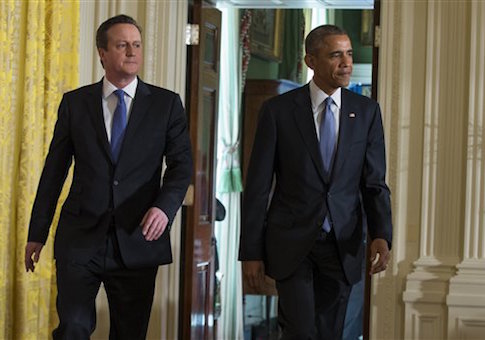The British government of Prime Minister David Cameron is embarking on policies that test relations with the United States and align it more closely with China, including cutting defense spending below levels required by NATO and supporting a China-backed competitor to the World Bank.
In recent weeks Cameron has refused to say whether his government, if re-elected, would continue to spend at least 2 percent of GDP on defense.
"As part of their commitment to the NATO alliance, member states are expected to spend a minimum of 2 percent GDP on the defense budget," Liam Fox told the Washington Free Beacon. Fox is a member of Parliament and a former minister of defense for the United Kingdom.
He continued, "If we want to maintain our moral authority and leadership within the alliance, we cannot afford to become one of those countries who want the insurance policy, but expect others to pay the premium."
Reduced UK defense spending over the past five years already has reduced the size of British ground forces to their lowest levels—well under 100,000 troops—in over a century and could potentially leave the British military able to field only one full strength division in the event of major hostilities.
Cutbacks in British airpower have also been evident, especially in the fight against the Islamic State (IS) where British planes contribute only about 10 percent of coalition air strikes against the jihadist organization.
The future of the British nuclear deterrent also is in question. A decision needs to be made soon if the UK is to maintain its small fleet of nuclear capable submarines and Trident missiles, but sentiment within Cameron’s Conservative Party is divided over the need for a future nuclear deterrent.
The opposition Labour Party strongly opposes funding a modernization program.
President Obama raised the issue with Cameron in January, according to a report in the New York Times. In addition, General Ray Odierno, the Army’s chief of staff, has taken raised concerns over the issue.
The Cameron government has also decided to become a founding member of the Asian Infrastructure Development Bank, widely seen as a competitor to the U.S.-led World Bank. Following Britain’s announcement, Germany, France, and Italy all followed suit, ignoring calls from the Obama administration to refrain from participating.
Long a vocal defender of liberal values on the international scene, in recent months Britain has offered only muted criticism of China’s harsh treatment of pro-democracy protestors in Hong Kong.
Since the end of World War II, the United States and UK have built a "special relationship" around a common view of security threats, liberal values, defense spending priorities, and shared intelligence.
The scope and nature of the relationship became the centerpiece of the NATO alliance, serving as a powerful deterrent against Soviet aggression throughout the Cold War. In recent years, the UK was a major contributor to and supporter of the wars in Iraq and Afghanistan.
Former Secretary of Defense Robert Gates in 2010 said NATO had become a "two tier" alliance in which the United States and UK met their commitment to spending at least 2 percent of GDP on defense while other members did not.
The future of this spending target remains uncertain. Says Fox, the former minister of defense, "We have made a commitment as a nation. We should honor it."
